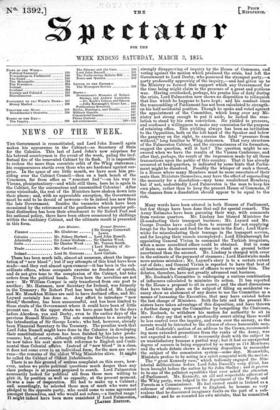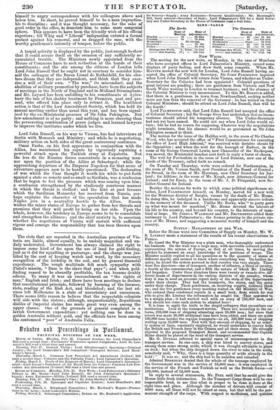Many words have been uttered in both Houses of Parliament,
but few things have been done that call for special remark. The Army Estimates have been pursuing their way, with comments from various quarters. Mr. Lindsay has blamed Ministers for ill-conducting their transport business; Mr. Layard and Mr. George Dundas have called them to account for not supplyeing
forage for the beasts and food for the men in the East ; Lord rd- . wicke for miscalculating their tonnage in the transport service, and for keeping their vessels unemployed ; Lord Ellenborough for appointing General Vivian to command the Turkish irregulars, when a more accredited officer could be obtained. But in none of these cases do the accusers appear to stand on ground better ascertained than the accused. Mr. Lindsay is charged with error in the estimate of the payment of steamers ; Lord Hardwicke made more serious mistakes ; Mr. Layard's story is to a certain extent out of date; and General Vivian is reported to have that best of all testimonies the willingness of officers to serve under him. The debates, therefore, have not greatly advanced real business.
Mr. Roebuck's Committee is undergoing a curious combination. of influences calculated to minimize its action. It has reported to the House a proposal to sit in secret; and the short discussions that have taken place on the subject of filling an accidental va- cancy show an abatement of any desire to use the Committee as a means of harassing the Executive, that may have existed before the last change of Ministers. Both the late and the present Mi- nisters have taken advantage of this disposition, and have thrown a further damp upon the Committee by compelling the Chairman, Mr. Roebuck, to withdraw his motion for authority to sit in secret : they say that with a professedly secret sitting there would be less control over the inquiry, and even over the secrecy, as the secrets would be intrusted to the silence of eleven honourable men.
Lord Goderioh'a motion of an address to the Crown, recommend- ing more extended promotions from the ranks of the Army, was not expected to succeed : it necessarily dealt with the subject in an unsatisfactory because a partial way ; but it had an unexpected degree of success in being supported by so many as 114 Members; and the whole debate shows a dawning disposition to reconsider the subject of the commission system—some day. Meanwhile, Ministers profess to be acting in a spirit congenial with the motion. The " great Kennedy case," which tediously engaged the Min- isterial deliberations before Lord John Russell's coup d'etat, has been brought before the nation by Sir John Shelley ; and it proves to be one of the paltriest squabbles that ever asked the attention of Parliament. Mr. Kennedy, an old and respectable adherent of the Whig party, was lodged in the department of the Woods and Forests as a Commissioner. He had earned credit in Ireland as a reformer of abuses; removed to England, he became so very zealous that he discovered imaginary faults on the part of a sub- ordinate; and he so resented his own mistake, that he committed. himself to angry correspondence with his colleagues above and below him. In short, he proved himself to be a man impractica- ble to discipline; and it was thought necessary, for the sake of good order in the office, to translate him to some more congenial sphere. This appears to have been the friendly wish of his official superiors ; till Whig and " Liberal" indignation entered a formal protest against his removal, and so dragged the ease, with the worthy gentleman's infirmity of temper, before the public.



























